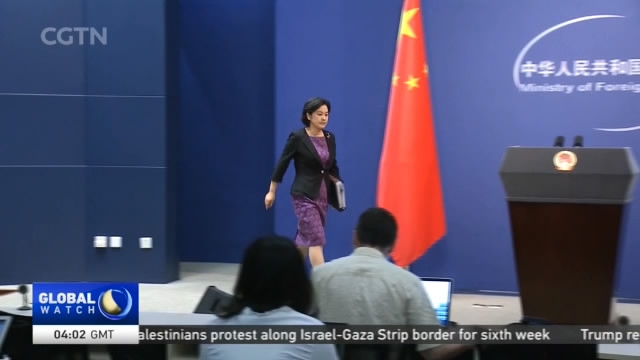
12:38, 05-May-2018
China-US Trade Talks: Two sides agree to keep talking while big differences remain
02:53

We start in the Chinese capital, where senior officials from Beijing and Washington have held talks on trade relations. Both sides agreed to continue their discussions by setting up a work mechanism. The US delegation, led by Treasury Secretary Steven Mnuchin, finished their two-day visit on Friday. The team will report to President Donald Trump on Saturday.
ZOU YUN BEIJING "After two days of talks, there were no breakthroughs. Yet, China and the U.S. reached agreements on some issues. Both sides say a sound and stable China-U.S. trade relationship is crucial and they are committed to resolving relevant economic and trade issues through dialogue and consultation. Both sides exchanged views on issues of greatest concern, including increased U.S. exports to China, bilateral trade in services, two-way investment, and protection of intellectual property rights. They reached consensus in some areas. To stay in close touch, the U.S. and China also agreed to set up procedures to do that. While both recognized considerable differences still remain on some issues, they agreed that continued hard work is required for more progress.
China's Foreign Ministry spokeswoman, Hua Chunying, said at Friday's daily press briefing that there are repeated and increasing calls from international community for the U.S. to respect WTO rules. There are also an increasing number of people in the U.S. who oppose trade protectionist measures. Hua said trade protectionism is detrimental to everyone."
HUA CHUNYING, SPOKESPERSON CHINESE FOREIGN MINISTRY "A joint letter from the US economists pointed out the essence and harm of the tariffs imposed on China by Washington. It once again proved that unilateralism and protectionism are no different to conducting a self-isolating siege. It does not conform to the rules of the market. It will do harm to not only others but also the US."
The White House issued a statement, saying the talks were constructive-though the two sides remained far apart.
"The United States delegation affirmed that fair trade will lead to faster growth for the Chinese, United States, and world economies."
Will the U.S. hold off imposing tariffs on 150 billion dollars' worth of Chinese imports while the talks continue. A big question for global stock markets-and tens of thousands of businesses potentially affected by the trade friction.
If the White House proceeds, China has vowed to slap tariffs on imports of U.S. aircraft, vehicles and soybeans or just stop buying them.
During the talks, Chinese negotiators brought up the recent case of cellphone company ZTE. The U.S. Commerce Department banned ZTE from buying American-made parts for seven years-a ruling that could destroy the company.
NATHAN KING WASHINGTON "U.S. negotiators said they would report China's stance to Donald Trump. Cases like ZTE and others are seen as tests of whether Washington is willing to make concessions as well as demands."

SITEMAP
Copyright © 2018 CGTN. Beijing ICP prepared NO.16065310-3
Copyright © 2018 CGTN. Beijing ICP prepared NO.16065310-3